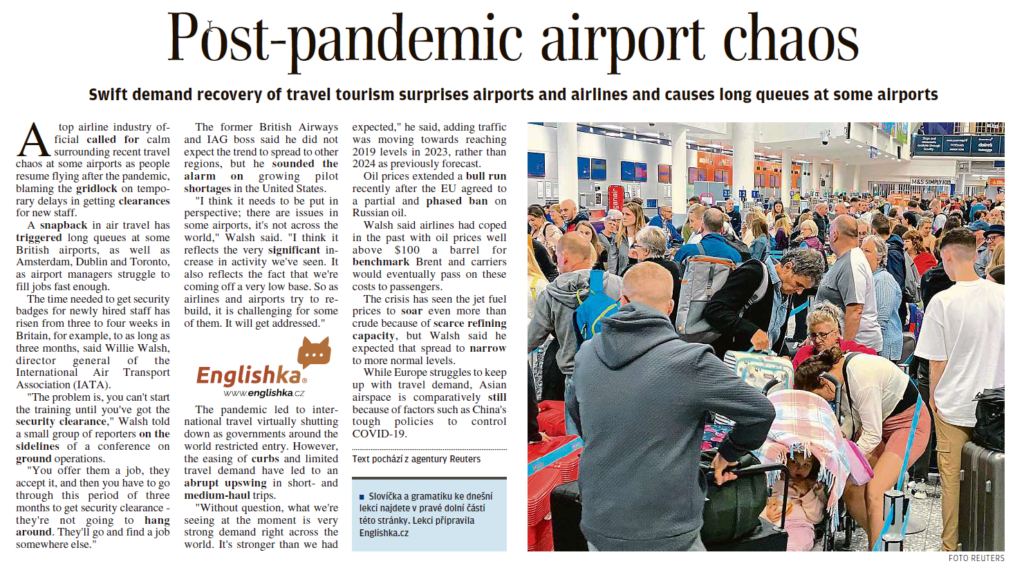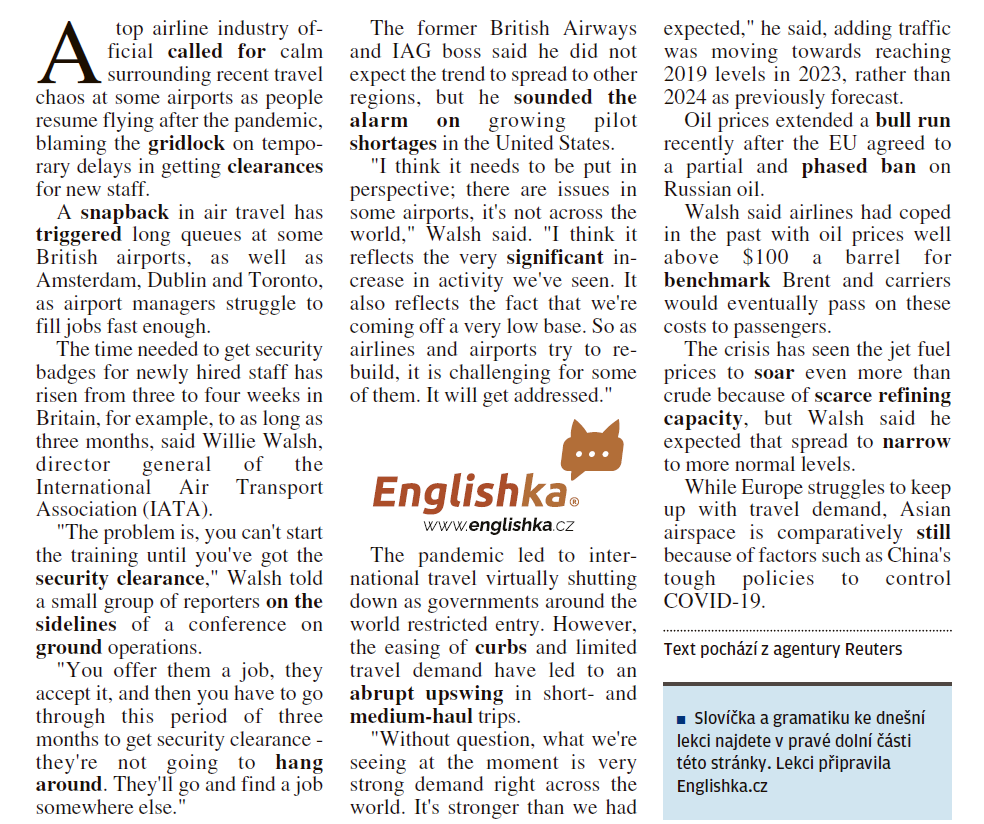Angličtina pro pokročilé s novinovými články (8.) – chaos na letištích

Obnovení cestovního ruchu po pandemii s sebou mimo jiné přineslo velký chaos na letištích.
Do covidové doby se nikdo vracet nechceme, ale k článkům a anglickým slovíčkům z letiště určitě ano.
V tomto článku na vás čeká novinový úryvek, vypsaná slovní zásoba, vysvětlená gramatika a na závěr krátké cvičení.
Pojďte si procvičit porozumění v angličtině! 🦊
1. Novinový článek
Post-pandemic airport chaos
Swift demand recovery of travel tourism surprises airports and airlines and causes long queues at some airports


A top airline industry official called for calm surrounding recent travel chaos at some airports as people resume flying after the pandemic, blaming the gridlock on temporary delays in getting clearances for new staff.
A snapback in air travel has triggered long queues at some British airports, as well as Amsterdam, Dublin and Toronto, as airport managers struggle to fill jobs fast enough.
The time needed to get security badges for newly hired staff has risen from three to four weeks in Britain, for example, to as long as three months, said Willie Walsh, director general of the International Air Transport Association (IATA).
„The problem is, you can’t start the training until you’ve got the security clearance,“ Walsh told a small group of reporters on the sidelines of a conference on ground operations.
„You offer them a job, they accept it, and then you have to go through this period of three months to get security clearance – they’re not going to hang around. They’ll go and find a job somewhere else.“
The former British Airways and IAG boss said he did not expect the trend to spread to other regions, but he sounded the alarm on growing pilot shortages in the United States.
„I think it needs to be put in perspective; there are issues in some airports, it’s not across the world,“ Walsh said. „I think it reflects the very significant increase in activity we’ve seen. It also reflects the fact that we’re coming off a very low base. So as airlines and airports try to rebuild, it is challenging for some of them. It will get addressed.“
The pandemic led to international travel virtually shutting down as governments around the world restricted entry. However, the easing of curbs and limited travel demand have led to an abrupt upswing in short- and medium-haul trips.
„Without question, what we’re seeing at the moment is very strong demand right across the world. It’s stronger than we had expected,“ he said, adding traffic was moving towards reaching 2019 levels in 2023, rather than 2024 as previously forecast.
Oil prices extended a bull run recently after the EU agreed to a partial and phased ban on Russian oil.
Walsh said airlines had coped in the past with oil prices well above $100 a barrel for benchmark Brent and carriers would eventually pass on these costs to passengers.
The crisis has seen the jet fuel prices to soar even more than crude because of scarce refining capacity, but Walsh said he expected that spread to narrow to more normal levels.
While Europe struggles to keep up with travel demand, Asian airspace is comparatively still because of factors such as China’s tough policies to control COVID-19.
2. Slovíčka
call for [kɔːl fɔː] žádat, požadovat
gridlock [ˈgrɪdˌlɒk] kolaps (dopravní)
clearance [ˈklɪərəns] povolení, oprávnění
snapback [snæpbæk] rychlé oživení, návrat
trigger [ˈtrɪgə] spustit, vyvolat
security clearance [sɪˈkjʊərɪtɪ ˈklɪərəns] bezpečnostní prověrka
on the sidelines [ˈsaɪdlaɪnz] bokem, mimo
ground [graʊnd] pozemní
hang around [hæŋ əˈraʊnd] nečinně čekat (hovor.)
sound the alarm on [saʊnd ðɪ əˈlɑːm ɒn] vyslat varovný signál, varovat před čím
shortage [ˈʃɔːtɪdʒ] nedostatek
significant [sɪgˈnɪfɪkənt] významný
curb [kɜːb] omezení
abrupt upswing [əˈbrʌpt ˈʌpˌswɪŋ] prudký vzestup
medium-haul trip [ˈmiːdɪəmˌhɔːl ˈtrip] středně dlouhá cesta/let
bull run [ˈbʊlˌrʌn] strmý nárůst ceny
phased ban [ˈfeɪzd ˈbæn] postupný zákaz
benchmark [ˈbentʃˌmɑːk] referenční
soar [sɔː] prudce stoupnout
scarce refining capacity [skeəs rɪˈfaɪnɪŋkəˈpæsɪtɪ] nedostatečná rafinační kapacita
narrow [ˈnærəʊ] zúžit, zmenšit
still [stɪl] klidný
3. Gramatika
V dnešním textu se objevilo slovní spojení get addressed ve větě: „It will get addressed.“ (Bude se to řešit.) Slovo get je v angličtině jedním z nejuniverzálnějších a nejčastěji používaných sloves. Pokud se vyskytuje ve spojení s přídavnými jmény nebo také s příčestím minulým, jako v našem příkladě, vyjadřuje často změnu stavu nebo začátek nějaké činnosti, např. get dark (stmívat se), get married (oženit se / vdát se) nebo get worried (začít si dělat starosti). Hovorově se s get setkáme také tam, kde bychom použili trpný rod s pomocným slovesem být. Např. „I was fired.“, hovorově: „I got fired.“ (Vyhodili mě.)
4. Cvičení
Doplňte do vět vazbu „get“ a příčestí minulé sloves v závorkách ve správném tvaru a čase:
1. IATA says post-pandemic airport chaos … (will / fix).
2. A top airline industry official … (worry) about the current travel situation.
3. Oil prices … (increase) in the last 3 weeks.
.
.
.
.
Řešení: will get fixed, gets worried, (have) got increased
Pokud chcete pokračovat ve čtení, zkuste článek o Fordovi a elektromobilech, marihuaně v Thajsku, o cigaretách v Británii, nebo o autonomních autech.
A já se tu na vás budu těšit zase příště! 🦊
Peťa



